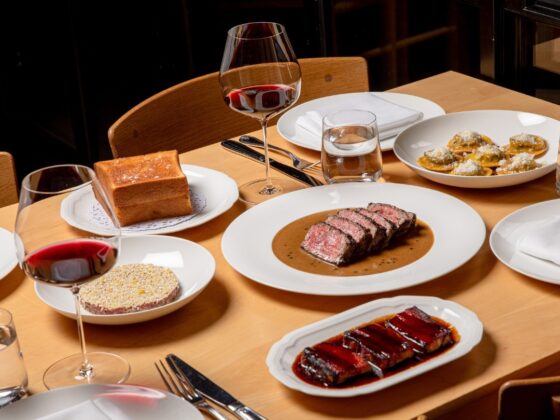It’s a tough time to be a restaurant owner. The competition is fierce, the rent is sky-high, and new technologies are forcing the owners to spend more money on equipment than ever before. Making a profit is pretty hard and entering the industry is not recommended at this time.
While the restaurant business isn’t booming as it once was, the catering industry is going through a renaissance. There are more customers, services, and funds in the industry than there ever were. In fact, according to research done by IBISWorld, the catering industry in the US is now worth $11.7 billion.
That’s one of the reasons the catering industry attracts a wide range of entrepreneurs, from experienced tycoons to inexperienced solopreneurs. If you want to start a catering business without any experience, you’ve come to the right place.
ADVERTISEMENT |
Today, we are going to show you how to start a catering business and how not to fail at the first go…
The Legal Side of Business

Create a Business Plan
Before doing anything, you need to come up with a business plan. This stage mainly involves researching your competitors, target demographics, etc. After you do all of the necessary research, you need to start working on the actual business plan. The plan needs to be broken down into the following sections:
- Company Mission Statement/Your Short Term Objectives
- Startup Costs and Expenses
- Ownership and Tax Structure
- Target Demographics
- Your Services and Offerings
- Top Competitors Analysis
Even if you don’t have the information to create a grand plan, make sure to write a few sentences in each section. Later, as you move forward with the plan, that draft will help you steer the ship.
Sort Out the Legal Matters
To start a catering company, you will need the following:
ADVERTISEMENT |
- Contract template: For every wedding, party, or corporate event you cater, you will need to sign a contract with your customer. If you don’t know how and legal jargon confuses you, simply hire a lawyer to write a template for you.
- Tax entity: Catering involves entering someone’s home, feeding people, and having physically active employees. That means you need a tax entity that will provide legal protection. If you’re starting a catering business, you should go with an LLC or a corporation.
- Permits and licenses: Different provinces and if you are working in the USA, states, require different permits and licenses. In some cases, requirements vary from county to county. Nonetheless, some of the basic permits you need include food establishment, alcohol, and a business permit, to name a few.
The Business Side of Catering
Establish Your Business Goals
Your goals need to be realistic. That might be hard to figure out, especially if you have never owned a business before, however, you need to sit down and write down your plans and ambitions. See how much money you are willing to invest during the first year and how much money you want to make in return. Also make sure to know where and how will you structure your business. For instance check llc florida requirements.
On the other hand, you may want to set different goals for your business.
Perhaps, instead of setting out to make $100,000 during the first 12 months, maybe you should aim to cater between 70 and 100 events during that period. No matter what goals you set for yourself, you need to review them every few weeks or months.
The more experience you gain, the easier it will be to see what’s realistic and what’s not.
Pick a Pricing Structure
Ask yourself, do you want to offer a fully-customizable menu or do you want to specialize in a particular cuisine? Both options have their advantages and disadvantages. Whatever you decide, make sure to test the recipes with your friends and family first to make sure you’re confident in your offering. According to KitchenAll experts, this is best acheieved by actually creating a banquet for your friends and family just like you would do for the client.
ADVERTISEMENT |
Obviously, your pricing and menus might change over time. If your customers are not satisfied with your pricing and/or if there are items on the menu that simply aren’t selling, you need to change the prices and introduce new meals. This is the only way to go if you want your business to succeed.
We are living in an era of instant gratification and the customers expect their feedback to be heard and their ideas to be acted upon almost immediately. That means, if you want success, you need to listen to your customers closely.
The Basics of Marketing

ADVERTISEMENT |
Pick Your Platforms
In 2019, more than 68,000 catering businesses were registered in the United States alone. By now, the number has surely increased. This means that there’s a ton of competition in the field. If you want to be noticed, you need to invest a certain amount of time and money into marketing.
Word of mouth and referrals are great but you cannot rely solely on them to give you exposure. You need to start spreading the word about your business locally. Here a few ways to do it:
- Try partnering with a few local florist shops that most of their business at weddings
- Start giving out free food samples to people who pass by your prep kitchen
- Also, try reaching out to food bloggers that live near you
Besides, you need to leverage the power of the Internet to market your business. Look at your demographics, see which social media platforms they use more often and create profiles on them. And don’t forget to set up a profile on a couple of review websites as well.
ADVERTISEMENT |
Determine Your Marketing Budget
Once you pick your platforms, it’s time to see how much money will you invest in marketing on these platforms. Marketing on certain social media platforms will only cost you time and effort, however, there are certain things you’ll end up spending money on.
For example, running targeted ads on Facebook, Instagram, or Twitter won’t cost you a lot, but you still need to plan how many ads you’ll run and for how long. Therefore, sit down, look at all of your expenses and review your remaining funds.
As the Food News Feed explains, an average startup allocates between 25% and 35% of their remaining budget towards marketing. If you’re not sure about the budget, this is the rule of thumb:
ADVERTISEMENT |
- If you have more than 10 big competitors, invest 35% of your remaining budget
- If you have less than 10 big competitors, invest 25% of your remaining budget
Over time, as you start gaining more exposure and are on your way to developing a loyal customer base, you’ll be able to decrease your marketing spend.
The Bottom Line
At the end of the day, no matter how much money is possible in it, every business is hard in its own way. Of course, catering is no different. Before you invest all of your time and money into any venture, you need to know the ins and outs of the business and be aware of what you’re getting into.
The catering business is demanding both physically and mentally. Even if you have a background in hospitality or you’ve worked as a cook for several years, success is not guaranteed. However, with a ton of hard work, lots of planning, and a bit of luck, you’ll make it.
ADVERTISEMENT |
After all, if you got will for the catering business, there’s a way.







